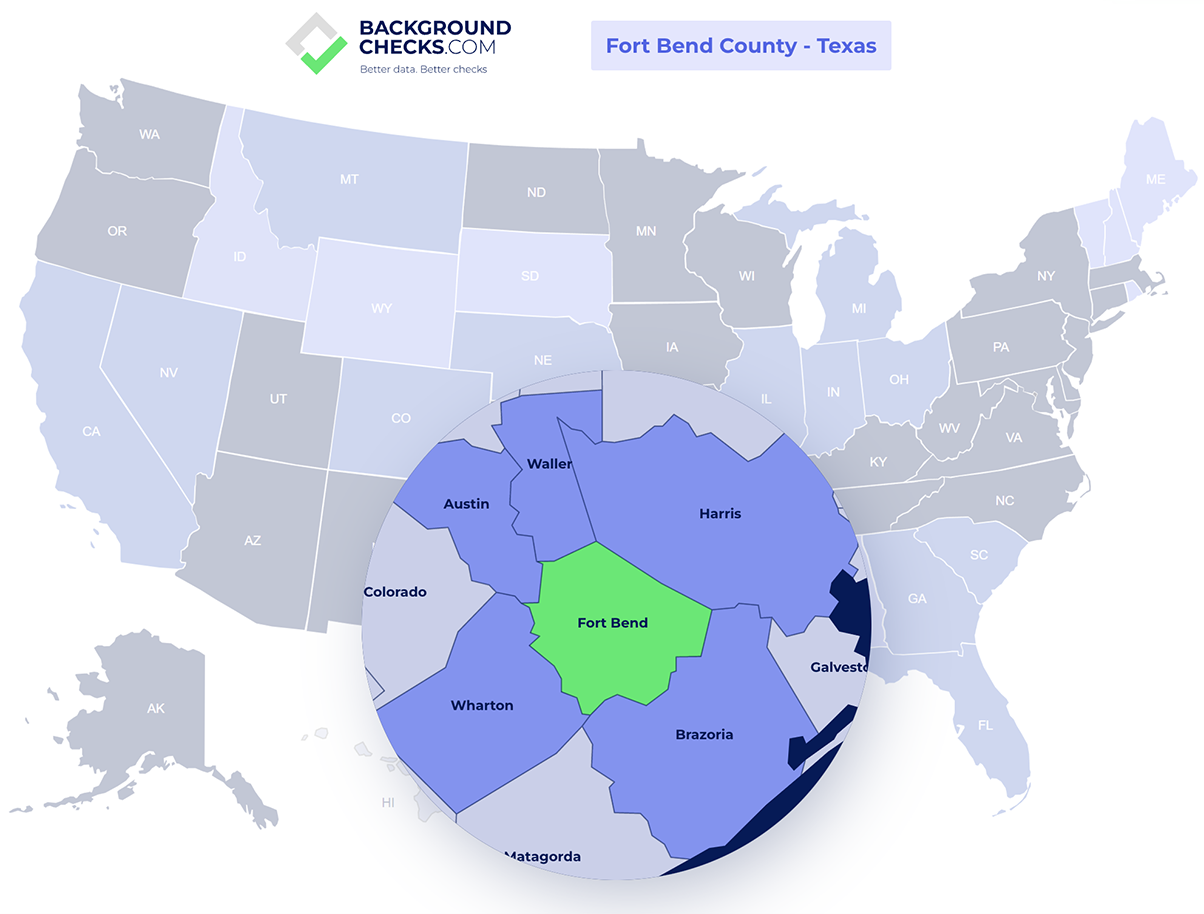Fort Bend County Texas Court Records: Your Ultimate Guide To Accessing Public Legal Data
When it comes to Fort Bend County Texas court records, there's a treasure trove of information waiting for you. Whether you're conducting background checks, researching legal cases, or simply satisfying your curiosity, this guide's got you covered. Think of it as your personal cheat sheet to navigating the ins and outs of public court records in one of Texas's most vibrant counties.
Fort Bend County, known for its rapid growth and diverse community, is no stranger to transparency in legal matters. The county takes pride in making court records easily accessible to the public, which is a game-changer for anyone looking to dig into legal history. But hold up, it’s not as straightforward as you might think. There are nuances, tips, and tricks that can save you time and energy when diving into this world of legal docs.
Before we dive deep, let me set the stage: court records are more than just dry legal jargon. They’re stories—sometimes dramatic, sometimes mundane, but always packed with details that can affect lives. So, whether you're a curious citizen, a journalist chasing a scoop, or someone looking to settle a score, this guide’s got all the info you need to access Fort Bend County Texas court records like a pro.
Read also:Huntington Auto Loan Customer Service Comprehensive Guide To Expert Assistance
Why Fort Bend County Texas Court Records Matter
Alright, here's the deal: court records aren’t just for lawyers and judges. They’re public documents that hold significant weight in everyday life. Whether you're buying a house, hiring an employee, or even dating someone new, having access to court records can give you crucial insights. In Fort Bend County, these records are especially important because the county’s population has boomed over the years, meaning there’s more data than ever before.
Understanding the Importance of Public Records
Public records, including court records, are part of the backbone of democracy. They ensure transparency, accountability, and fairness in legal proceedings. In Fort Bend County, where diversity and growth have shaped the community, access to these records empowers residents to make informed decisions. Plus, let's be real—sometimes it's just plain interesting to see what goes down in court!
Think about it: a court record could reveal a person’s criminal history, property disputes, or even bankruptcy filings. These details aren’t just numbers on a page—they’re pieces of someone’s story. And in a county like Fort Bend, where the population is expected to continue growing, understanding how to access and interpret these records is becoming increasingly valuable.
How to Access Fort Bend County Texas Court Records
Now, let's get practical. How exactly do you access these records? It’s easier than you might think, but there are a few steps to follow. First off, Fort Bend County offers both online and in-person options, so you’ve got flexibility depending on your preference. Let’s break it down:
- Online Access: The county provides a digital portal where you can search for records from the comfort of your couch. All you need is an internet connection and a bit of patience.
- In-Person Visits: If you’re old-school or just prefer the personal touch, you can visit the Fort Bend County Courthouse. Bring some coffee and maybe a snack—it can be a bit of a waiting game.
- Third-Party Services: There are also private companies that specialize in gathering court records. While they might charge a fee, they can save you time if you’re short on it.
Pro tip: When searching online, use specific keywords like "Fort Bend County Texas court records" to narrow down your results. And always double-check the credibility of any third-party services you use.
Types of Court Records in Fort Bend County
Not all court records are created equal. In Fort Bend County, you’ll find a variety of records covering everything from civil disputes to criminal cases. Here’s a quick rundown:
Read also:Timothy Olyphant Wife A Glimpse Into His Personal Life And Family
Civil Court Records
Civil records deal with non-criminal matters, like lawsuits, property disputes, and family law cases. These records are often sought after by individuals looking to resolve personal or business-related issues. For example, if you’re buying a house, checking for liens or lawsuits against the property can save you a lot of headaches down the road.
Criminal Court Records
On the flip side, criminal records are all about legal trouble. These include arrests, convictions, and even acquitted cases. Whether you’re doing a background check on a potential tenant or just curious about a neighbor’s past, criminal records are a goldmine of info.
Family Court Records
Family court records cover everything from divorces to child custody battles. These documents are often sealed to protect privacy, but in some cases, they’re accessible to the public. If you’re involved in a family law case, knowing how to access these records can be a huge advantage.
Step-by-Step Guide to Searching Court Records
Ready to roll up your sleeves and start digging? Here’s a step-by-step guide to help you navigate the process:
- Identify What You’re Looking For: Are you searching for a specific case or just browsing? Knowing your goal will save you time.
- Use the Right Tools: Fort Bend County’s online portal is your best friend. Enter keywords like "case number" or "defendant name" to narrow your search.
- Be Patient: Sometimes the system can be slow, especially during peak hours. Take a deep breath and keep trying.
- Verify the Info: Once you find what you’re looking for, double-check the details. Mistakes happen, even in official records.
And hey, if all else fails, don’t hesitate to reach out to the courthouse staff. They’re usually happy to help and can provide guidance if you’re stuck.
Legal Restrictions and Privacy Concerns
While court records are public, there are still rules to follow. Some records are sealed for privacy reasons, especially in sensitive cases like juvenile offenses or adoption proceedings. It’s important to respect these restrictions and understand why they exist.
Additionally, misuse of court records can land you in legal trouble. For instance, using someone’s criminal record to discriminate against them in employment or housing is against the law. Always use the information responsibly and ethically.
Understanding Sealed Records
Sealed records are those that aren’t available to the general public. They’re typically restricted for reasons like protecting minors or safeguarding sensitive information. If you need access to a sealed record, you’ll likely need a court order, which can be a lengthy process.
Data and Statistics: The Numbers Behind Court Records
Fort Bend County handles thousands of cases each year, and the numbers are only growing. According to recent statistics, civil cases make up a significant portion of the court’s workload, followed closely by criminal cases. Family law cases are also on the rise, reflecting the county’s expanding population.
These stats aren’t just numbers—they tell a story about the community’s legal landscape. For example, an increase in property disputes might indicate a booming real estate market, while a rise in criminal cases could point to underlying social issues.
Key Stats to Know
- Fort Bend County handles approximately 50,000 cases annually.
- Civil cases account for nearly 40% of all filings.
- Criminal cases make up around 35% of the caseload.
- Family law cases have increased by 20% over the past five years.
These figures highlight the importance of understanding court records and their impact on the community.
Best Practices for Using Court Records
Now that you know how to access and interpret court records, let’s talk about best practices. Here are a few tips to keep in mind:
- Verify Sources: Always cross-check information with multiple sources to ensure accuracy.
- Respect Privacy: Use the data ethically and avoid sharing sensitive info unnecessarily.
- Stay Updated: Laws and regulations around court records can change, so keep an eye on updates.
- Seek Professional Help: If you’re dealing with complex cases, consider consulting a lawyer or legal expert.
Remember, court records are powerful tools, but with great power comes great responsibility. Use them wisely!
Common Challenges and Solutions
Let’s face it—accessing court records isn’t always a walk in the park. Here are some common challenges you might encounter and how to overcome them:
Challenge #1: Incomplete Records
Sometimes, records are incomplete or missing key details. This can happen due to clerical errors or outdated systems. To tackle this, try reaching out to the courthouse directly for clarification.
Challenge #2: Overwhelming Amount of Data
With so many cases to sift through, it’s easy to get lost in the sea of information. Use filters and search tools to narrow down your results. And if all else fails, take breaks to avoid burnout!
Conclusion: Empower Yourself with Knowledge
Fort Bend County Texas court records are more than just legal documents—they’re tools for empowerment. Whether you’re conducting research, performing due diligence, or simply satisfying your curiosity, knowing how to access and interpret these records can open doors you never knew existed.
So, here’s your call to action: take what you’ve learned and put it into practice. Start exploring the world of court records in Fort Bend County. Share this guide with friends, leave a comment if you have questions, and don’t forget to check out other resources on our site. Knowledge is power, and now you’ve got the keys to unlock it!
Remember, the legal world can be complex, but with the right guidance, you can navigate it like a pro. Happy researching!
Table of Contents
- Why Fort Bend County Texas Court Records Matter
- How to Access Fort Bend County Texas Court Records
- Types of Court Records in Fort Bend County
- Step-by-Step Guide to Searching Court Records
- Legal Restrictions and Privacy Concerns
- Data and Statistics: The Numbers Behind Court Records
- Best Practices for Using Court Records
- Common Challenges and Solutions
- Conclusion: Empower Yourself with Knowledge


